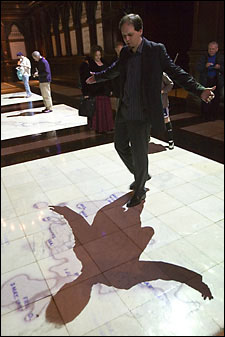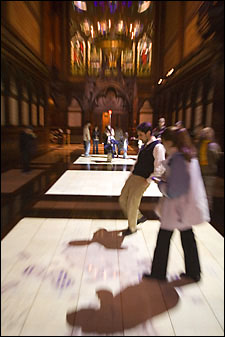Installation explores price of conflict
Knep’s ‘Deep Wounds’ at Memorial Hall
Memorial Hall was given to the University in 1878 in remembrance of Harvard students who died in defense of the Union during the Civil War. This month, the Union soldiers are joined by their Confederate classmates in “Deep Wounds,” a temporary art installation by local artist Brian Knep that explores relationships destroyed by conflict and the possibility of healing.

The marble floors of Memorial Hall are bathed in white light, a luminous “skin” containing faint hints of text, revealing epithets for Harvard students who died in service of the Confederacy. The soldiers are listed in chronological order by class, and are identified by personal connections such as “roommate,” “son,” and “brother” along with dates and locations of death, leaving viewer-participants to ponder destroyed relationships.
In an interview, Knep recounts the death of brothers fighting on opposite sides in one battle; of a soldier at Gettysburg who died facing a Union regiment composed of fellow Harvard grads; of Abraham Lincoln’s own brother-in-law, who is here represented.
Knep was attracted to the history of Memorial Hall; he saw the space as a forum to address the concept of unfinished healing, a theme that underlies some of his previous abstract pieces.
The installation is a blend of artifact and technological advancement; it explores a historical issue through the media of computers, cameras, projectors. Mounted cameras scan the illuminated pools for color-contrast. Where it is recognized, customized software computes an algorithm for biological pattern formation to generate the “wounding” and “healing” configurations that provide glimpses into relationships of the past. The artist focuses on the idea of personal agency in reconciliation. “I like the idea that it is only through your actions that the wound is revealed,” he states. “You need to do some work to heal it.”
The implementation of “Deep Wounds” is only a part of Knep’s yearlong residency, a pioneer collaboration between the Department of Systems Biology (DSB) at Harvard Medical School and the Office for the Arts at Harvard College. The formation of this unique partnership was largely serendipitous. In fall 2003, when DSB was in its nascent stages, executive director Becky Ward wandered into Knep’s South End studio. She became enthralled with an interactive piece when a conversation with Knep revealed that the response pattern was governed by actual biological equations used to model nerve impulse propagation. Knep’s work was conceptualized on the idea of complex patterns and behaviors arising from simple rules; this is a founding pillar of Systems Biology, which explores the collective behavior of biological processes as the result of individual interactions. The idea of an artist-in-residence at DSB was born from Ward’s realization that communities of artists and scientists were pondering the same concepts from completely different angles.

A year later, Knep met Cathy McCormick, director of programs at the Office for the Arts. She took an interest in Knep’s work and invited him to Harvard for 2005-06. As part of his art residency, Knep shadows researchers at the Department of Systems Biology on a weekly basis, and participates in panels and roundtable discussions at the Schools of Medicine and Design. He has also visited undergraduate classrooms and Houses. Knep has become a central character in fostering dialogue among the disciplines. His residency lays the foundation for a common ground between artists and scientists.
On a recent evening, children from Cambridge public schools emerged from a dance rehearsal at Sanders Theatre and descended upon “Deep Wounds.” Some raced obliviously for the exit while others loitered at the periphery of the pools of light. They began interacting with the piece; some strolled through the center, while others moved carefully, assessing the piece’s reaction to their every step. Their movements confront Memorial Hall with the opening and subsequent healing of rifts from centuries past. In both his art and joint residency, Knep hopes to explore the possibilities of reconciliation in politics and academia.
‘Deep Wounds’ is on display daily at Memorial Hall until April 23.




